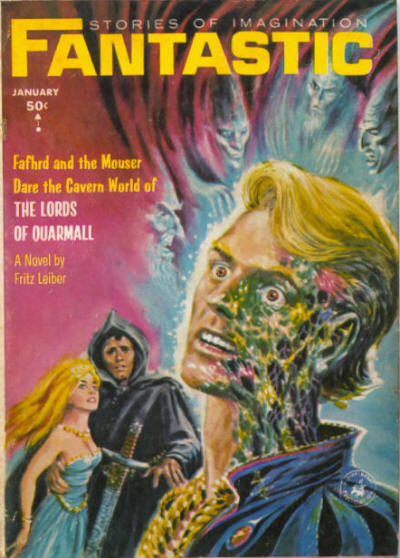Summary:
 Festin, an unoffensive wizard who desires to learn patience, is knocked from behind by a rival wizard, left without his staff, guarded by magic and a troll. He escapes as a gas, liquid, an eagle, and fish, but only gets caught and more battered and bruised than before. His enemy is Voll, an undead wizard.
Festin, an unoffensive wizard who desires to learn patience, is knocked from behind by a rival wizard, left without his staff, guarded by magic and a troll. He escapes as a gas, liquid, an eagle, and fish, but only gets caught and more battered and bruised than before. His enemy is Voll, an undead wizard.Commentary:
Festin only escapes when he "unbinds" himself from himself (perhaps needing to lose the sense of himself he had) and drives Voll back into his own, dead, old-man body. Festin means "banquet and "Voll" means "full"--likely intended ironically in this barren land where they end up together.
This is an early work by Le Guin. From my research, her work hadn't been anthologized until the 1970s, after The Left Hand of Darkness and her two award-nominated stories the same year. This work brought her earlier work attention, even though some of it was when she was still learning her craft.
Usually her Earthsea works are a kind of subtle wisdom literature, imparting life lessons for youth. This story's unique strength is its ending and its plot--various attempts to escape a magic prison. It has little characterization or development.
However, the final moment/image is potent, poignant, where the protagonist is left, alone in a desert land, trying to guard his undead enemy from ever arising and attacking the wizard again. The remainder of his existence is this defensive yet lifeless position. Is he better off? In a sense, yes, he is not the prisoner and has learned the patience he desired; but as the jailer, he's living a miserable, dry existence. As his rival is never named and the protagonist himself is not characterized and he has no enemies, there's a pervading sense that Festin is guarding himself against some aspect of his own self, perhaps his own future, his mortality which haunts his present.
Usually her Earthsea works are a kind of subtle wisdom literature, imparting life lessons for youth. This story's unique strength is its ending and its plot--various attempts to escape a magic prison. It has little characterization or development.
However, the final moment/image is potent, poignant, where the protagonist is left, alone in a desert land, trying to guard his undead enemy from ever arising and attacking the wizard again. The remainder of his existence is this defensive yet lifeless position. Is he better off? In a sense, yes, he is not the prisoner and has learned the patience he desired; but as the jailer, he's living a miserable, dry existence. As his rival is never named and the protagonist himself is not characterized and he has no enemies, there's a pervading sense that Festin is guarding himself against some aspect of his own self, perhaps his own future, his mortality which haunts his present.

No comments:
Post a Comment